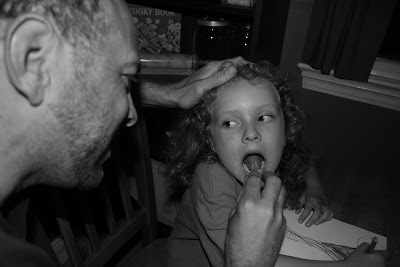For the past two years I have participated in the Steele Canyon High School's annual job fair. My friend is the college guidance counselor there, and she makes terrific efforts to see that a variety of occupations are represented. And I must admit, it tickles me to see the folding table set up with the WRITER sign affixed to the front. (I usually sit next to another mutual friend of ours who is an ARTIST.)
When the bell rings, the kids all flock to the various tables (especially the ones with the flashy displays -- MEDICINE, MARKETING, MILITARY). It's hard not to feel insecure sitting with my little stack of books and xeroxed handout with helpful links to writer's websites and MFA programs. My ARTIST friend usually entices the kids with some sort of collaborative art project to participate in at her table. Plus, she has an easel, and art!
I am always pleasantly surprised by how many students come to me -- especially when they could be learning about the rewards of being a DENTIST! A PARALEGAL! A MENTAL HEALTH PROFESSIONAL!
But the ones who arrive with their clipboards and questions are earnest and enthusiastic as they read from their notes:
1. How did you become a writer?
The first one is easy. Though this is where I usually lose a lot of kids. "I went to college, studied English, went to graduate school for two years, went to graduate school again. Yes, four years of graduate school."
Is that required? "No. Actually many writers don't go to school at all." (And I must admit this wins some of them back.) "I wrote books. I got lots of rejections. I got an agent. I got my first book published." And so on.
2. What do you like most about being a writer?
The second question is also easy. "I get to wear pajamas to work every day. I'm home with my children. I love what I do. I get paid to make stuff up."
Which, inevitably leads to:
3. Can you actually make a
living as a writer?
Hmmm. Must tread lightly here. I look at their eager faces. I know exactly what they're thinking. Because I was one of them once. They are thinking E.L. James, Stephanie Meyer, Stephen King. Imagining world tours, signing books before adoring masses. A country home with a writing studio in some elaborate garden filled with impossible flora and fauna. Money, travel. Money.
And so I say, "It takes a while." The truth.
A few duck away, head to FINANCE, I imagine. But the remaining cluster and nod knowingly.
"It's hard, I say. "You have to be prepared to do a lot of odd jobs to support your writing." I list the jobs I've had:
Waitress
Retail (high end and low end)
Telemarketer
Ticket Sales
School of Fisheries Archivist
Temp (Real Estate, Air Conditioning, Bio-tech)
Secretary for a Tyrannical Architect
Admin Assistant (for a software developer, for an IT firm)
Free-lance child's muralist
Teacher (of grown-ups, of undergrads)
Their eyes widen in disbelief.
"You have to be brave," I say. And I suddenly envision myself not as WRITER but as WARRIOR. "You don't get health insurance. You don't even get a regular paycheck."
A few more silently slip away.
Those who remain, the quiet girl with the glasses, the shy kid with acne and a beaming smile, look at me both intrigued and terrified.
But now? they ask, hopeful.
"Now I write. Full-time. And I wouldn't trade any of those jobs, those struggling years, the uncertainty and fear, for anything." Because I am a WRITER. And there aren't that many of us who can say that and mean it.
A few months ago, I submitted a proposal to my publisher for a new novel. As a WRITER, you never know from one contract to the next what will happen next. If this might be the end. It's both awful and thrilling, but mostly awful. As I waited, I counted my marketable skills -- which I really only need a couple of fingers to count. It's times like these that I have to remind myself (the pajamas! being home with my kids! making stuff up! doing what I love!) Because it's all precarious.
And then, finally, I heard back. An offer for three more books. And so now, joy of joys, I have the promise of three more years of writing, three more books made with beautiful paper and gorgeous covers. Three more years where I can work in my jammies, volunteer at my girls' school (and be here when they get home), to set up shop in the land of make believe, and do what I love to do. And I can breathe again, counting not marketable skills but lucky stars that I get to do what I do for a
living. For my life.
And I hope that's enough to keep at least a few of those high school kids from wandering off toward INVESTMENT BANKING or, God forbid, POLITICS.
 Mr. Penumbra's 24-Hour Bookstore by Robin Sloan
Mr. Penumbra's 24-Hour Bookstore by Robin Sloan














